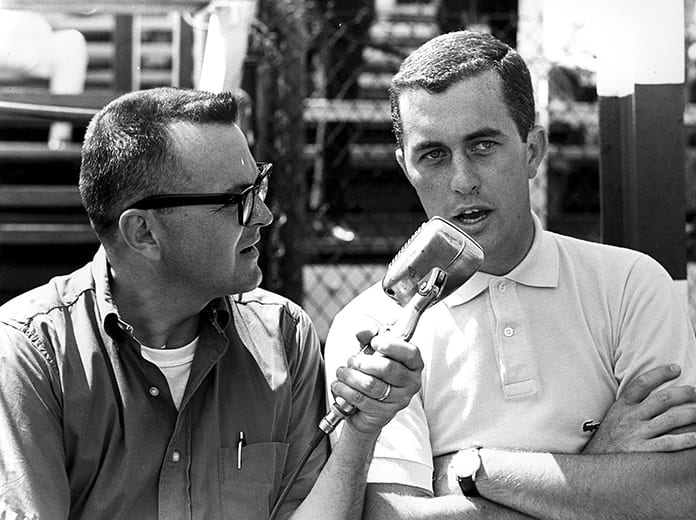No celebration of the 85th anniversary of SPEED SPORT would be complete without remembering Chris Economaki.
Known as The Dean of American Motorsports Journalism, Economaki was editor of National Speed Sport News for 60 years, having begun his career selling single copies of the newspaper at local race tracks.
Economaki died in 2012 at age 91.
His column, the Editor’s Notebook, was the most- read feature in National Speed Sport News for six decades. The Notebook, as it was called by readers, was the most meaningful read in the newspaper, each week.
Economaki was known for his unique, recognizable voice, which he used first as a track announcer and later through nearly 40 years on television.
He worked with ABC’s “Wide World of Sports,” he was with CBS and ESPN, and it can be said he was one of the catalysts in bringing racing to television. It is not an oversimplification to say he knew racing and knew how to speak about it.
Born in Brooklyn, N.Y., in 1920, Economaki’s father was a Greek immigrant and his mother was a great-niece of Confederate General Robert E. Lee. Economaki spent his childhood in Ridgewood, N.J., and saw his first race at the Atlantic City board track when he was 9 years old.
He was hooked and by his 14th birthday he was a fixture in the racing world. Economaki sold his first copies of NSSN at Ho-Ho-Kus Speedway when he was 13. Papers sold for a nickel and Economaki got to keep a penny.
“I sold 200 papers,” Economaki recalled. “That was $2. An incredible amount of money in 1934.”
Economaki had his first story published in 1935 and soon began writing his own column, known then as Gas-O-Lines, while continuing to peddle newspapers.
Much of Economaki’s knowledge about race cars — and people for that matter — was acquired during 1938 and 1939 when he traveled the eastern half of the United States as a “stooge” (mechanic) for legendary midget racer Duane Carter.

“He would pay me $15 a week when he could, which was rarely,” Economaki liked to say when recalling his days busting his knuckles and learning the “tricks of the trade.”
After serving in the Army during World War II, including a stint in the European Theater of Operation, Economaki returned to New Jersey and rekindled his passion for auto racing, selling newspapers and announcing at race tracks throughout the East.
“I got out of the service in February of 1946, and I immediately started going to races, and I picked up with paper sales, except I didn’t do the selling,” he explained. “I had guys selling them for me.
“I was selling 700 to 800 copies a week,” he continued. “Business was excellent.”
It was his paper-sales career that led him to become an announcer.
“One weekend, I can’t remember where the hell I was, it was 1947, I sold a lot of papers on a Friday night, and Saturday night 50 miles away at another track, with even more people, I sold under 100, and I couldn’t understand that,” he said.
“It dawned on me that the difference was the announcer,” Economaki explained. “The Friday night guy really knew how to plug something, and the Saturday night guy didn’t. That’s when I decided to become an announcer.”
After more than a decade announcing at tracks and working as editor of NSSN, a job he accepted in 1950, Economaki got his big break when NASCAR founder “Big Bill” France recommended Economaki be part of ABC’s first telecast from Daytona Int’l Speedway in 1961.
“That first race, July 4, which was taped and shown the following Saturday, I got there and these guys didn’t know which way the cars went,” Economaki remembered. “They were telling me what I should say, and I said, ‘I can’t really say that.’
“And I remember, the guy said, ‘Jesus Christ, this guy has never been on television before, and he’s a prima donna.’ He said, ‘Well, what would you like to say?’
“And I said this, that, and the other thing, and they said, ‘OK, that’s pretty good, you can say that.’ So they allowed me to speak my mind, and that began my television career.”
Economaki worked races for ABC through the 1983 season when he made the jump to CBS where he appeared through the mid-1990s. He also worked Formula One telecasts for ESPN in 1987 and ’88.
Economaki received countless awards, including the NASCAR Award of Excellence, and been elected to numerous Halls of Fame, most notably the Motorsports Hall of Fame of America, National Sprint Car Hall of Fame and National Midget Auto Racing Hall of Fame.
Economaki’s legacy remains alive in the pages of SPEED SPORT Magazine.
Subscribe to SPEED SPORT Magazine today, or order the 85th Anniversary issue of SPEED SPORT!
